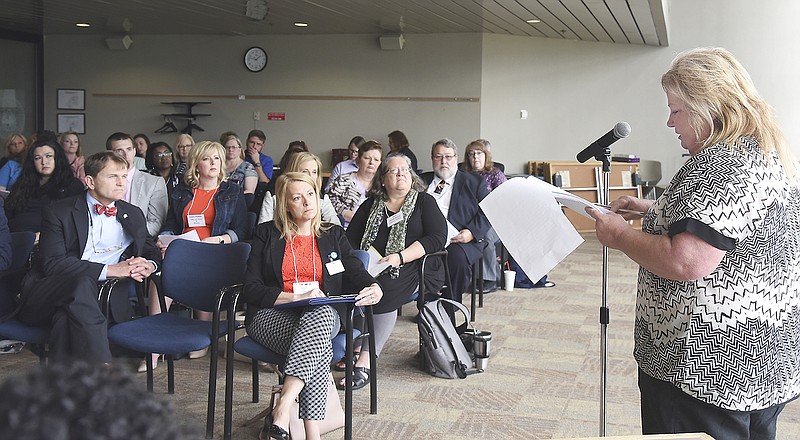Gov. Mike Parson is looking to the Child Care Working Group to begin groundwork that will ensure the future of the state's children.
Made up of staff from his office, the attorney general's office and state departments of Health and Senior Services, Social Services, Public Safety, and Elementary and Secondary Education - the group has held regular meetings since its inception March 5. The group came about, in part to respond to several highly publicized incidents of children being mistreated at day care centers.
On Wednesday, about 30 invited stakeholders from schools, child care centers, child care providers and others gathered at the Harry S. Truman Office Building, to discuss their concerns and offer feedback to the group.
The group has until June 1 to present recommendations to the governor about how best to ensure safe, quality child care.
Parson is passionate about the workforce infrastructure, Director of Health and Senior Services Randall Williams told the gathering.
"The workforce really starts with those parents having a safe place to take their children," Williams said. "We are looking long-term, not a year-long project, but foundationally at making Missouri's infrastructure workforce better."
Science, he pointed out, has demonstrated the importance of reading to children at a young age. Forty percent of children can't read at a fourth-grade level. To effect that, child care providers have to start at a younger age.
"If you read to the brain and you hear words - even in utero, then that develops the brain structure (which) actually adapts," Williams said. "And the brain becomes more adept at language skills."
Until fourth grade, Williams said, children are learning to read, but after fourth grade, they are reading to learn.
Missouri has some 3,000 licensed child care facilities, he said. And they serve about 168,000 people each year.
Meeting organizers asked the stakeholders to respond to four questions:
How can we enhance safety in child care?
How can we enhance quality in child care?
How can we encourage and strengthen professional development opportunities for the child care workforce?
What are two or three actions the state should set as priorities for improving safety and quality?
Several of those in attendance said their challenges are becoming more and more difficult.
Julie Schmitz, director of Show-Me Child Care Center, said the number of children with special needs enrolled in child care increases each year.
Child care providers don't argue that DSS and DHSS requirements for them to receive assistance changes periodically.
"What is an argument to us," Schmitz said, "is that we don't have the flexibility to go into a community and get the child care training that we need for our children."
Karen Werner, with Missouri Association of Child Care Providers, said safety is a top concern for providers.
"But, if you're going to add more safety rules to us, you're going to have to expect more funding to come along with them," Werner said. "The new funding for the new child care background screenings are great, but eventually we're going to have to pay for those finger-printings and time spent to go to those finger-printings."
Funding provided by the Department of Social Services/Children's Division-Early childhood Section is set to expire Sept. 30.
"Some subsidy money there would be nice," Werner said.
Missouri law requires all new child care providers and staff receiving federal Child Care and Development Fund money to submit fingerprints to the Missouri Highway Patrol. The prints are used to screen for criminal history with the state and with the FBI.
By Missouri law, the screenings must be repeated every five years, or after a person has been separated from employment as a child care provider or removed from a licensed facility for 180 days and begins working at another facility.
All the providers want quality child care and fight for child care, but funding is the greatest hurdle they face, Werner said.
Lisa Eberle-Mayse, the inclusion services director for United 4 Children - a nonprofit that provides support to child care and after-school programs - said Missouri does have training, but needs more.
"Research into brain development is confirming what I've always known in my heart," Eberle-Mayse said. "The first years are so critical for development for children."
Missouri should implement a comprehensive, statewide system of training, and ongoing and on-site support for children's social and emotional health.
"If these skills are not developed early, these children struggle not just in school, but later in life," Eberle-Mayse said. "Yet teachers rarely receive the professional and personal support they need to address the challenging behaviors and emotional needs of children."
The resulting stress pushes well-qualified people out of the child care profession.
Williams concluded the discussion by thanking the men and women in attendance.
Some may see child care as a career or profession, he said. But, for the people in the discussion, child care is a passion, he said.
"I think," Williams added, "what you do is a calling."

